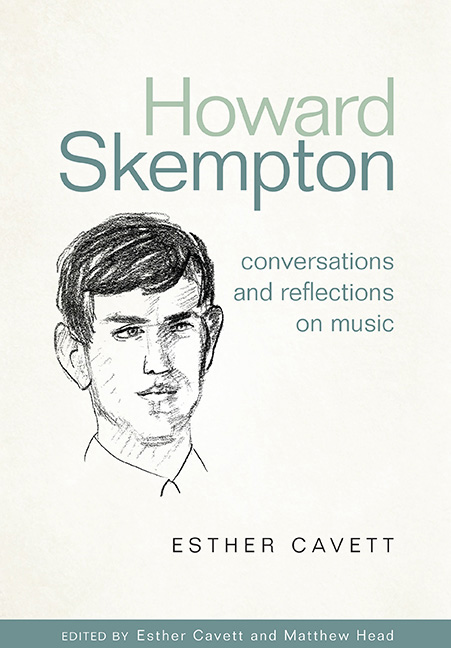Book contents
- Frontmatter
- Dedication
- Contents
- List of illustrations
- List of contributors
- Preface
- Roles and acknowledgements
- Introduction
- Editorial conventions
- Timeline
- Chapter One Histories
- Chapter Two Influences
- Chapter Three Pattern and shape
- Interval: Previously unpublished manuscripts
- Chapter Four Influencing
- Conversation Four: On teaching composition
- Lessons were “magical”: Skempton's composition students
- Reflection Four, “Not a lot spoken, but a lot said”: Skempton as teacher and composer
- Chapter Five Performing
- Chapter Six Narrative and closure
- Appendix One Authorized worklist
- Appendix Two Discography of first commercially distributed recordings
- Select bibliography
- Index
Reflection Four, “Not a lot spoken, but a lot said”: Skempton as teacher and composer
from Chapter Four - Influencing
Published online by Cambridge University Press: 10 September 2019
- Frontmatter
- Dedication
- Contents
- List of illustrations
- List of contributors
- Preface
- Roles and acknowledgements
- Introduction
- Editorial conventions
- Timeline
- Chapter One Histories
- Chapter Two Influences
- Chapter Three Pattern and shape
- Interval: Previously unpublished manuscripts
- Chapter Four Influencing
- Conversation Four: On teaching composition
- Lessons were “magical”: Skempton's composition students
- Reflection Four, “Not a lot spoken, but a lot said”: Skempton as teacher and composer
- Chapter Five Performing
- Chapter Six Narrative and closure
- Appendix One Authorized worklist
- Appendix Two Discography of first commercially distributed recordings
- Select bibliography
- Index
Summary
Though she worked at being kind and considerate, the effect was of a powerful musical personality who stayed pretty much in the range between intimidating and terrifying. … For sure, the most difficult class was the Thursday morning encounter (among ourselves, we referred to it as the Black Thursday class) … After [that] class most of us went to the cafe opposite … for a coffee or beer. The amount of effort we had expended in the class invariably left us shaken and silent. (Glass, 2015, pp. 142–43)
One other thing I wanted to mention was that the word “tenderness” doesn't only describe the music, but also the man. He was the most gentle of people to learn from. He didn't push me and gave all of his students opportunities to think and listen. He created an environment in which we could be curious and discover. I do a bit of composition teaching now, and I don't know how I do it, but I know that it certainly comes from him. Teaching works that way. (Luke Deane, C4 §93)
The above reflections – the first by Philip Glass on being taught by Nadia Boulanger, the second by Luke Deane on his lessons with Howard Skempton – illustrate the wide pedagogical gap that emerged during the twentieth century in composition as a taught discipline. One might place on one end of this scale the “strict” approach, where emphasis is placed on discipline and method, while at the other end lies the “free” approach.
The strict approach is predicated on the notion that a grasp of the foundations which govern musical technique are essential prerequisites before composing can take place. Of course, different interpretations can be found amongst those teachers who adopt the strict approach, ranging from choice of repertoire and selection of historical periods and styles to varying emphases on aspects of technique. Boulanger is often cited as the paradigmatic example of the strict approach. Focusing on species counterpoint, figured bass, clef reading, and aural training, her teaching eschewed the styles and techniques of twentieth-century music (Johnson, 2010, pp. 51–97).
- Type
- Chapter
- Information
- Howard Skempton: Conversations and Reflections on Music , pp. 149 - 168Publisher: Boydell & BrewerPrint publication year: 2019



